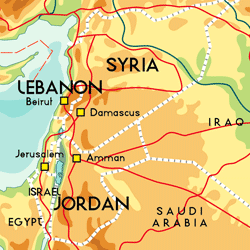 Jordan’s announcement that it has foiled an al Qaeda plot to bomb the capital highlights the threat to Washington’s ally from Islamist fighters hardened by conflict in neighbouring Syria, and the danger of Damascus trying to export its crisis.
Jordan’s announcement that it has foiled an al Qaeda plot to bomb the capital highlights the threat to Washington’s ally from Islamist fighters hardened by conflict in neighbouring Syria, and the danger of Damascus trying to export its crisis.
The kingdom is no stranger to turmoil. For decades it has navigated the Israeli-Palestinian conflict on its western border and more recently bloodshed in Iraq to the east, which spilled over to Jordan with hotel bombings in Amman seven years ago.
But the Syrian civil war could pose the gravest threat yet to Jordan’s pro-Western King Abdullah, whether or not rebel fighters succeed in toppling President Bashar al-Assad after 42 years of Assad family rule.
The overthrow of Assad by Sunni Muslim rebels could embolden hardline Sunni Islamists in Jordan, while a weakened but still fighting Assad may try to deflect pressure by spreading the conflict to his neighbours, Jordanian politicians say.
Mahmoud Kharabsheh, a prominent politician with an intelligence background, says Syria’s role in letting al Qaeda fighters head to Iraq after the 2003 U.S.-led invasion has reinforced fears that Damascus could try the same in Jordan.
“The Syrian regime will not leave a stone unturned to destabilise the kingdom. The Syrian regime is determined to export its crisis to neighbouring countries to … destabilise our security,” said Kharabsheh, a member of the outgoing Jordanian parliament.
At the height of the bloodshed in Iraq, Damascus emptied its prisons of many radical Islamists and let them cross the border to fight the Western forces. This allowed Assad’s secular government to get rid of domestic Islamist opponents, at least temporarily, and indirectly pin down forces of its U.S. enemies.
Those radicals have returned home to fight Assad, and have been joined by fellow Islamists from Jordan.
Kharabsheh said the Syrian government might again try to use its ideological opposite, al Qaeda, as it struggles for survival. “They are two imminent dangers and their interests could easily coincide to destabilise Jordan,” he said.
Scores of Syrians had been arrested in recent months after gathering information and acting as agents provocateurs in Jordan’s Zaatari refugee camp, which houses tens of thousands of Syrians who have fled their country, he added.
Then on Oct. 21, Jordan state TV said intelligence services had foiled the plot by an al Qaeda-linked cell to bomb shopping centres and assassinate Western diplomats in Amman, using weapons and explosives smuggled from Syria..
Although some expressed scepticism about the threat posed by 11 al Qaeda suspects who were arrested – including teenagers and young students – there is little dispute that the Syrian conflict has galvanised Jordan’s jihadists.
HISTORY OF ENMITY
Despite urging Assad to step down, Jordan has tried to accommodate the Syrian authorities, fearing any overt intervention would revive tensions with Damascus. That hostility reached a peak in 1981 when Syria was accused of being behind a failed assassination attempt on Jordan’s prime minister and Amman harboured the Syrian Muslim Brotherhood.
Since the latest conflict broke out, Jordan has shown restraint in dealing with Syrian gun and mortar fire across its borders, with Amman trying to insulate itself from the military fallout, according to diplomats and politicians.
This contrasts with Turkey, whose forces have repeatedly fired on Syria since five of its civilians were killed early this month by shells and mortars from across the border.
But the combination of turmoil across Jordan’s northern border and growing demands for reform inside the Hashemite monarchy, inspired by uprisings across the Arab world, have left Amman particularly vulnerable.
One Western government official visiting the region last week compared Amman with Beirut, where a car bomb killed a prominent anti-Assad intelligence chief earlier this month and plunged the Lebanese into political crisis.
“I worry more about Jordan than Lebanon,” he said. “Lebanon has been through this before and has the coping mechanisms.”
ISLAMIST SLEEPER CELLS?
Jordanian analysts say Islamist groups are gaining ground among Syrian rebels, creating a new generation of battle- hardened jihadists like the “Arab Afghans” mujahideen who went toAfghanistan to fight Soviet troops in the 1980s and returned home to wage jihad against their pro-U.S. governments.
Political analyst Sami Zubaidi said jihadists who believe in waging holy war were sheltering among ultra-orthodox Salafi Islamists who support non-violent action. “There are sleeper cells in the jihadist Salafi groups in Jordan which did not find an arena inside Jordan and went to Syria,” he said.
“A lot of these jihadists go to Syria and get armed and develop their skills as though it was a training course before they return to Jordan armed to hit Jordanian targets,” he added.
Growing deprivation in impoverished areas such as the Jordanian city of Zarqa creates recruiting grounds for jihadists heading to Syria. Zarqa is the hometown of Abu Musab al-Zarqawi, once head of al Qaeda in Iraq who is blamed for the 2005 Amman hotel bombings which killed more than 50 people.
Only this month, two Jordanian Salafists were killed in Syria’s southern city of Deraa, just across the Jordanian border, while battling Syrian troops. They were among at least 250 jihadists who are estimated to have crossed into Syria.
The longer that conflict in Syria continues, the more fighters may be drawn to the battlefield.
But for many in Jordan’s security establishment, the biggest threat comes from the mayhem that would result from the toppling of the Assad regime.
“This is what scares me; if the regime falls in Syria and radical Islamist groups become influential there, it will be easier for these extremist groups to work here in Jordan and destabilise the country,” said Hazem al-Awran, a former parliamentarian.
Reuters

Leave a Reply
You must be logged in to post a comment.